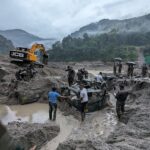Non-governmental organizations (NGOs) call on authorities to enforce child protection measures, citing violence and alarming living conditions.
Greece is facing a refugee “children’s emergency” as the number of unaccompanied minors entering the country increases and concerns grow over the lack of “safe zones” to house them.
Large numbers of children arrived in 2024 along a new trafficking route from Libya to Crete, causing NGOs to urge Greek authorities to implement emergency steps that would allow children to be moved to protected shelters or other EU member states.
Sofia Kouvelaki, who heads the Home Project, an organization that supports refugee and migrant children in Athens, said, “What we are seeing amounts to a children’s emergency of the kind that we haven’t witnessed in years.”
According to the UN refugee agency UNHCR, ten years after Greece was at the center of a refugee crisis when nearly a million EU-bound asylum seekers crossed its borders, child arrivals in Greece will more than triple year on year in 2024. In November alone, 13,000 minors entered the country via sea. Landings by unaccompanied and separated children have also increased dramatically, from 1,490 in 2023 to about 3,000 so far this year.
Kouvelaki said, “A huge number of kids are turning up on boats every day, and there is an urgent need for the creation of more safe spaces to house them.”
She explained that recent arrivals to the Home Project included very young children from Syria and Egypt.
Greece’s migration minister, Nikos Panagiotopoulos, predicted last week that pressure on eastern Mediterranean migratory routes to Europe’s southernmost border state will persist into 2025.
He told parliament, “The extensive geopolitical unrest in our broader region, where three wars are waging, the most recent in Syria, combined with the climate crisis, is forcing many to abandon their homes simply to survive.” “All these factors have led to a significant increase in migration and refugee flows since late 2023.”
As Christmas approaches, humanitarian organizations claim that hundreds of children on the frontline islands of Samos, Leros, and Kos are without clothes or shoes and have little or no access to basic services.
As Christmas approaches, humanitarian organizations claim that hundreds of children on the frontline islands of Samos, Leros, and Kos are without clothes or shoes and have little or no access to basic services.
Cuts by Greece’s center-right government, which has implemented a “strict but fair” migration policy, have resulted in fewer protective shelters. An estimated 1,500 unaccompanied adolescents around the country have been forced to fend for themselves.
Incidents of violence and abuse have increased in overcrowded state-run reception centers that commonly house children and adults together.
This month, authorities were put on the defense after it was revealed that an Egyptian adolescent had been gang-raped, beaten, and burned by at least four people, including two adults, following a disagreement over a phone. The attack on the Malakasa refugee camp in Athens sparked outrage. Officials said efforts were underway to offer an additional 500 spots for children in sheltered environments “once funding was secured.”
Sofia Voultepsi, the deputy migration minister, said, “We’re all shocked by this incident,” noting that of the 213 boys in the camp, 160 were from Egypt and allegedly “displayed intense signs of delinquency.”
she told the state broadcaster ERT, “Unfortunately, traffickers go to the poorest villages of Egypt, they convince parents to send the children to Europe to work, with the aim of sending them money, and then they transport them to Libya and from there to [the port city] Tobruk.” “There they put them in a huge camp and torture them and prepare and familiarise them in organised crime.”
Greek officials believe arrivals from Tobruk have increased by 400% this year.
Aid agencies, notably Save the Children, have highlighted significant flaws in Greece’s receiving system. They claim that overcrowding in camps and asylum-seeker facilities has been worsened by a lack of essential services such as interpreters and guardians, putting children at risk as their asylum applications were frequently delayed. According to migrant solidarity workers, EU money has been “hugely delayed” in reaching shelters since 2024.
The government recently declared that an agreement had been reached to “finally” address the shortage of interpreters.
Lefteris Papagiannakis, the director of the Greek Council for Refugees, stated, “When a part of the system malfunctions, everything malfunctions.”
Last week, the council issued a critical assessment, co-authored with Save the Children, on the “alarming” living circumstances that adolescents continue to experience in the country’s camps. “It is unacceptable that, even now, when so much money has been invested in Greece and we are no longer in crisis mode, that we should be discussing such basic issues.”
NGOs have urged Greek authorities to prioritize the early integration of asylum-seeking children and to enforce child protection measures immediately.
Willy Bergogne, Europe director at Save the Children, said: “Children fleeing humanitarian crises arrive in Greece hoping for safety but find themselves trapped in yet another crisis.” “Reception centres meant to shelter them have been places of fear and isolation, with violence, alarming living conditions and a lack of support services.”
Bergogne added that it is incumbent on officials to act immediately. “The EU and Greek authorities have a moral and legal obligation to act urgently to improve the conditions in these camps and protect these children.”













